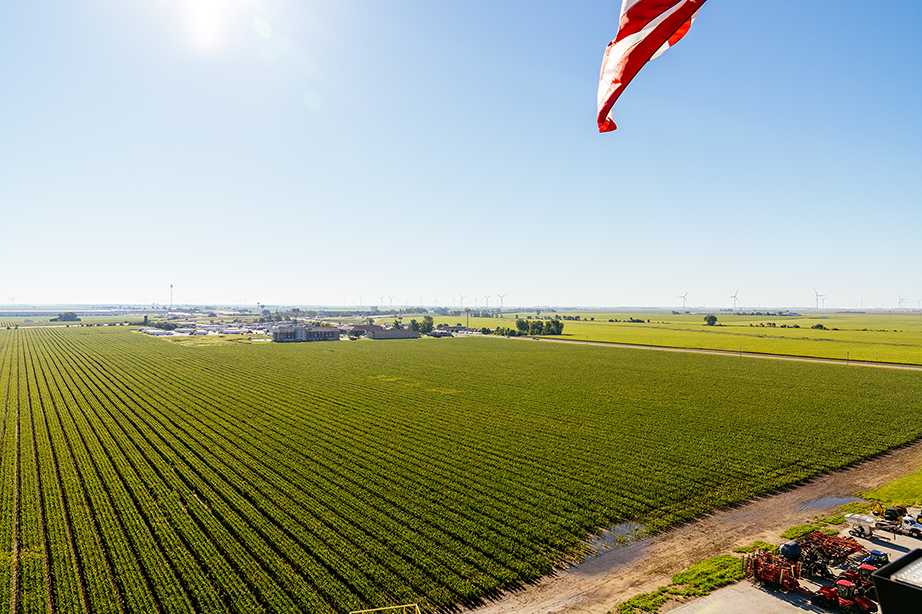Join us for an insightful expert interview with Steve Bruere, President of Peoples Company, a leading agricultural land transaction firm. With his extensive experience and exceptional leadership, Steve has become a prominent figure in the industry. In this interview, Steve delves into the critical topic of interest rates and their impact on farmland values. Drawing on his wealth of knowledge, Steve sheds light on the historical relationship between interest rates and farmland values, discusses current market dynamics, and provides valuable insights for considering farmland as an investment option.
Key Takeaways
1. The Relationship Between Interest Rates and Farmland Values
Steve Bruere: “The more inflation you have, the higher farmland returns you traditionally have. We're in this really interesting environment right now where you've got an inflationary environment, and you've also got a high-interest rate environment, and those two forces kind of compete against each other.”
Takeaway: Historically, low interest rates have led to rising farmland values, but the current shift to higher interest rates introduces a dynamic interplay between inflation and interest rates that shapes the farmland investment landscape.
2. Rising Interest Rates and the Farmland Market
Steve Bruere: “I think people that understand farmland understand that getting in is the hardest part, and that's the most important part. Getting access to the asset class. Then, once you've gotten access to it, as long as you have a long-term time horizon, it really doesn't matter if you paid a little more one year than if you bought it two years later and paid a little less. The key is you want to own farmland for the long haul. So, in the short term, I think the interest rate impact can temper prices a little bit. But over the long haul, as interest rates stabilize, I think farmland is going to continue to perform really well."
Takeaway: While short-term fluctuations, including potential interest rate impacts, may have some influence on prices, maintaining a longer-term perspective could provide stability and potential for successful farmland investments as interest rates evolve.
3. Advice for New Farmers and Investors
Steve Bruere: “Getting access to it, as I said earlier, where only 1% to 2% of the asset class turns over annually. Being able to even get exposed to it and diligence is a real challenge. You really need somebody who's your advocate if you're doing that, and you're not a farmland investor. Ongoing management of those assets is really important as well.”
Takeaway: Accessing the farmland market can be challenging, given its limited turnover. Having an advocate and exploring collaboration opportunities, especially for beginning farmers, can provide a viable path to entering this asset class, potentially benefiting both investors and operators.
4. What Makes Farmland Compelling
Steve Bruere: “I think there are a lot of things to be excited about. One, if you believe in the fundamentals of farmland—growing population, rising incomes, demand for food, fuel, and fiber—those fundamentals have never been stronger than they are today.”
Takeaway: Despite the challenges posed by rising interest rates, farmland as an asset class can be a compelling investment option to explore due to strong fundamentals and growing global demand for food, fuel, and fiber.
5. The Non-Financial Benefits of Farmland
Steve Bruere: "When you own farmland, you own part of the fabric of rural America and the jobs that come with that."
Takeaway: Investing in farmland isn't just about financial returns. It's about becoming a part of something bigger—the fabric of Rural America. Farmland ownership comes with unique non-financial benefits. It connects investors to local communities, offering opportunities for recreation and contributing to the growth of local economies.
Conclusion
Farmland investments can offer a unique blend of financial stability, non-financial benefits, and long-term growth potential. Whether you're a seasoned investor or considering farmland as an asset class for the first time, the enduring appeal of this space is hard to ignore. It's not just an investment; it's a connection to the land and a stake in the future of rural America.
As we conclude, it's important to remember that investment decisions, especially in an ever-evolving market, require careful consideration and professional guidance. The information presented here reflects Steve's informed opinions and observations. However, we strongly encourage consulting with financial experts and conducting due diligence before buying farmland.
